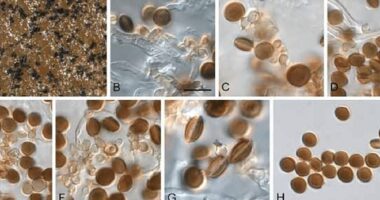A bowel cancer treatment that gives hope to people with the same aggressive form that hit Dame Deborah James has been approved for use on the NHS.
The drug combination – two medicines called trifluridine-tipiracil hydrochloride and bevacizumab – will be introduced following a US trial which found that for patients who had run out of treatment options it bought nearly an extra year of life.
And in some rare cases, it gave patients up to seven more years.
Experts say it is a significant step in the fight against the BRAF V6004E mutation, an incurable genetic form of bowel cancer which often affects the young.

Dame Deborah James had the aggressive BRAF mutation. Under the name Bowelbabe, the deputy headteacher went on to build up a massive social media following

A blood sample taken as part of testing for the mutation. Most sufferers do not live longer than ten months after diagnosis
Of the 42,000 Britons diagnosed with bowel cancer every year, about one in ten carry the BRAF mutation. Chemotherapy and other medicines quickly become ineffective, and most sufferers do not live longer than ten months after diagnosis.
Dame Deborah was just 35 in 2016 when she was diagnosed with BRAF bowel cancer. Under the name Bowelbabe, the deputy headteacher went on to build up a massive social media following while documenting her progress and raising awareness of the disease and its symptoms until her death in 2022.
The drug combination has been available privately in the UK for eight years, at a cost of about £2,000 a month.
However, last month the NHS spending watchdog, the National Institute for Health and Care Excellence (NICE), gave it the green light for patients who have already undergone two failed treatments. It is predicted that it will benefit about 1,000 people a year.
‘Many patients have been on the regimen for years privately, stalling the cancer in its tracks,’ says Anna Bennett, from the patient group Breaking BRAF, which campaigns for new treatments.
‘Some have achieved stability in excess of a year or two and we know of one patient who lived for nearly seven years more. We are delighted by this decision.’
Professor Marco Gerlinger, head of gastrointestinal cancer medicine at Barts Cancer Institute in London, says approval of the drug combo is a ‘fantastic development’.
‘For the past ten years there have been no highly effective drugs for this type of cancer,’ he adds. ‘But now we have a really great option for patients.’
The BRAF mutation causes cancers to grow quicker than they would otherwise. For this reason, people who carry it often see symptoms arise at an early age.
The mutation is also linked with skin and brain cancer, and appears to be more common in women.
BRAF cancers rapidly become resistant to treatment, meaning patients require different interventions to keep them alive.
During her six-year battle with bowel cancer, Dame Deborah underwent more than a dozen surgeries, 100 rounds of chemotherapy and more than ten targeted drug therapies.
Trifluridine-tipiracil hydrochloride – also known as Lonsurf – is a daily tablet that stops the growth of new cancer cells. Bevacizumab, also known as Avastin, works by blocking the formation of new blood vessels which feed tumours and allow them to grow. It is given intravenously every two weeks in hospital.
Both drugs are taken for as long as they remain effective.
The clinical trial, reported in the New England Journal of Medicine last year, concluded the combo provided an average of ten months extra survival, but many patients lived up to a year-and-a-half longer. The drugs also triggered few serious side effects, with the most common being nausea and vomiting.
While patient groups welcomed the decision by NICE to fund the treatment, they criticised the delay which meant many desperate patients ended up going private.
‘It’s unforgivable that we got into such a situation whereby so many patients died without access to a drug that could have given them months, if not years, more life,’ says Ms Bennett, whose sister Rebecca died from bowel cancer,

Mother-of-two Emily Georghiou, 47, from London, was diagnosed with bowel cancer in 2021
‘People now have hope when they previously faced the hideous decision of life versus debt.’
One patient who stands to benefit from the combo is mother-of-two Emily Georghiou, 47, from London, who was diagnosed in 2021.
‘Ever since chemotherapy failed for me, and I discovered I have the aggressive BRAF mutation, I have felt like a ticking time bomb,’ says Emily a former healthcare policy adviser. ‘We don’t have the money or private insurance to pay for drugs, and while I started a fundraiser I knew eventually I would run out of money to stay alive.
‘When you have this condition you very much live scan to scan – at any point your condition can change.
‘This announcement gives me hope, because if that time comes I now know it is there.
‘It is incredibly important I can be around for as long as possible for my beautiful boys.’
The patient group Breaking BRAF hopes to see another promising drug combo – botensilimab and balstilimab – approved in the near future. It also argues it is crucial that GPs are reminded of the signs of bowel cancer in young people, such as blood in faeces, unexpected weight loss, fatigue or feeling that the bowel doesn’t fully empty.
‘So many patients, including my sister, were dismissed by GPs until it became an emergency,’ says Ms Bennett. ‘With bowel cancer becoming more common in young people, it’s crucial doctors know the early symptoms.’










